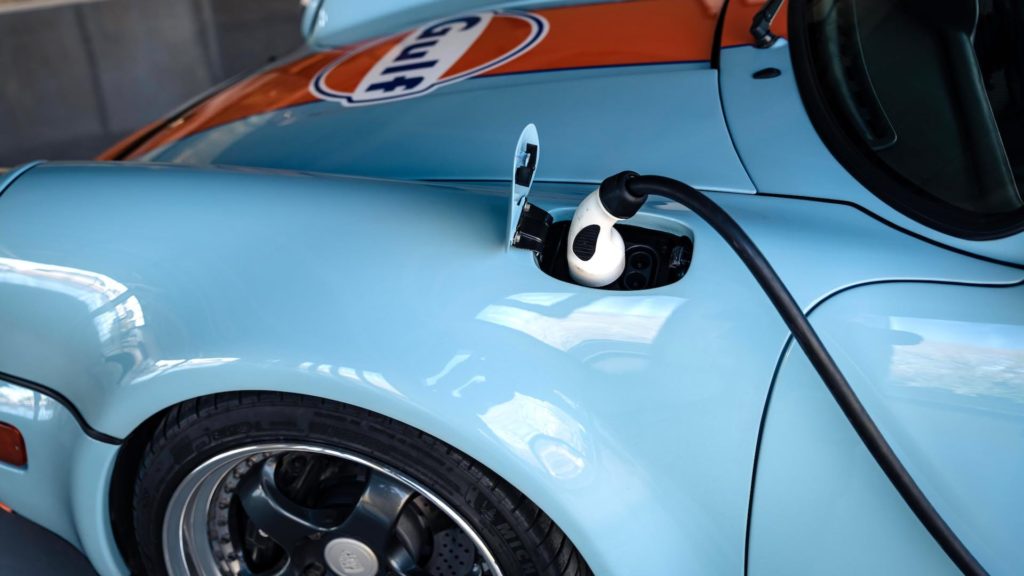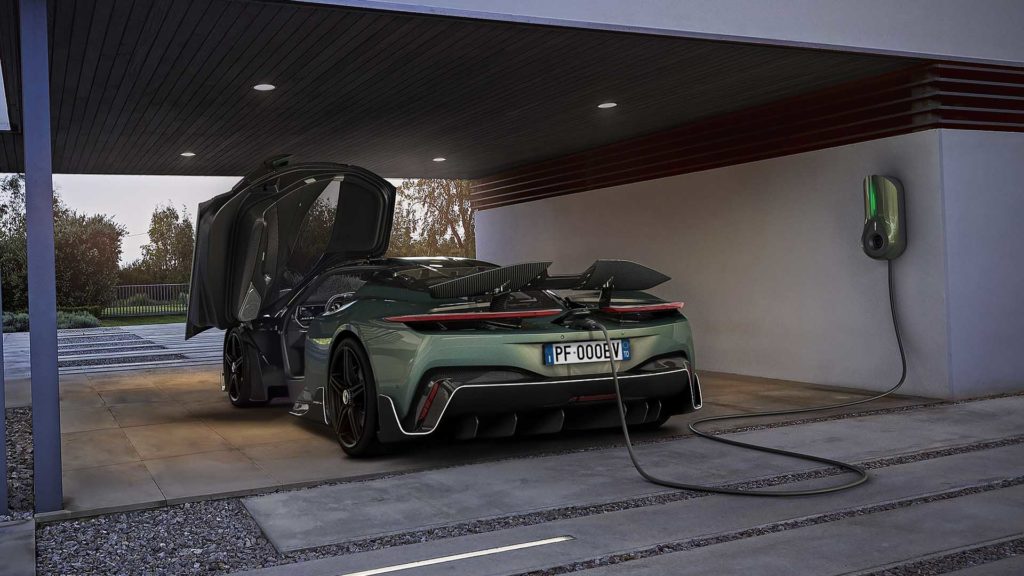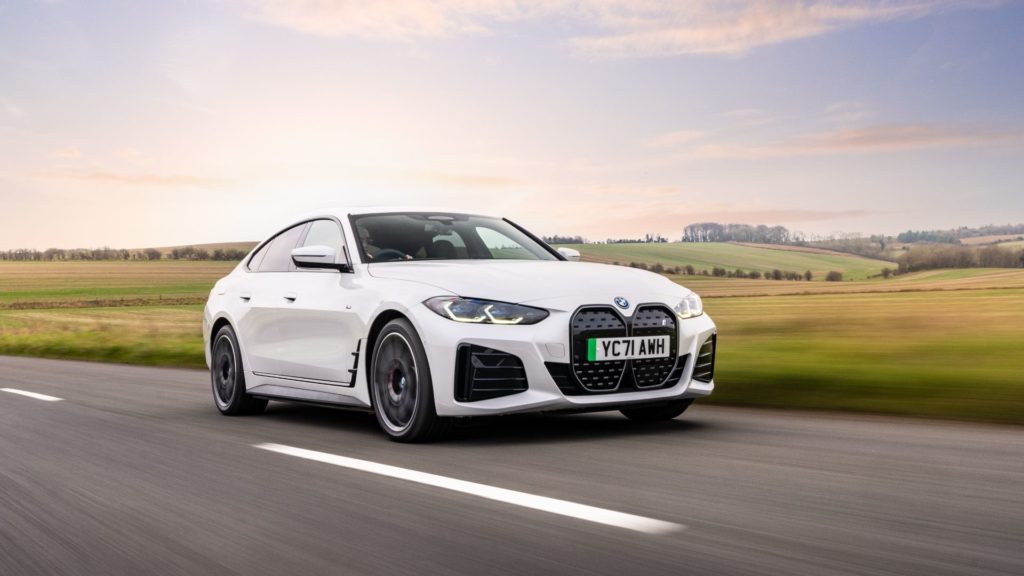If you own an electric car, you will want to charge it at home if possible. It’s just so convenient – and usually the cheapest option, too.
In fact, unless you’re one of the small number of (pre-2018) Tesla Model S or Model X owners who qualifies for free refuelling at Supercharger stations, the only reason you might not charge your EV at home is that you can’t – i.e. you don’t have an off-street parking space.
The convenience of home charging means you don’t need to interrupt your journey to stop at an overpriced motorway services. At public chargers, you may also have to wait for other EVs to leave before you can plug in, which makes the process take longer.
Setting up a home EV charger

You can plug your electric car into a standard three-pin UK plug socket. Electric cars come with the ‘granny cable’ to do this, and there’s no set-up fee.
However, this isn’t a practical long-term solution as charging takes so long – several days, potentially. What you need is confidence that an overnight charge, using cheaper off-peak electricity, will do the job. As the off-peak period lasts around eight hours, that really means a bespoke home charging point.
There are dozens of companies in the UK that can install home charging points. They do this by tapping into your domestic electrical circuit, then running new cables to a wallbox mounted outside your house. The fitting can usually be done within a single day.
Types of home charging points

Most new electric cars use Type 2 connectors. You don’t need to worry about choosing the wrong connector, though – your installer will select the correct type for your vehicle.
Then you need to choose the power rating: 3.6kW, 7kW or 22kW. The higher the power, the quicker the charge. However, 22kW domestic chargers only work if you have what’s called a three-phase electrical supply to your home. These are rare in the UK, so few people will have that option.
A 7kW wallbox charges at twice the rate of a 3.6kW device, and three times the rate of a standard plug socket. And as a 7kW device typically costs less than £100 more than a 3.6kW alternative, it’s the obvious choice.
You then need to choose between a universal charger and a tethered one. The universal charger only has a socket outlet. You plug the cable you carry in your car’s boot into the socket and the other end into the vehicle itself.
More convenient is the tethered type, which has a five-metre cable attached to the wallbox. Simply uncoil it and plug it into your car.
Costs of a home EV charging point

You can find the full list of approved suppliers of home charging points by visiting the government website. Booking an installation can also be done online.
Under the government’s EV chargepoint grant, people who live in flats or rented properties can claim back up to 75 percent of the cost of a fitted home charging point – up to a maximum of £350. You only qualify if your car is on the approved list and you have a private, off-street parking space outside your property.
Here are some example costs from Pod Point, one of the major players in the supply of domestic and commercial electric car chargers. Note: the £350 grant has not been deducted from these prices.
Power Universal Tethered Speed (up to)
3.6kW £798 £849 12 miles per hour
7kW £999 £1,049 22 miles per hour
22kW £1,749 £1,799 35 miles per hour
ALSO READ:
What are the pros and cons of an electric car?


[…] Find out more about having charging point installed at home. […]
I use my car throughout the day for work and I can’t charge it at home unless I use a 50m extension lead run from the house to my parking space. How do I run an electric vehicle?
I think you are pretty well ruled out of the game. Even the charger that’s supplied with your car, suitable for a domestic 13-amp socket, will be unhappy with an extension lead, and probably won’t work. So unless you can make charging work elsewhere for you, it’s a no-go, sorry to say.
So what we are in effect saying is that anyone who lives in a terraced house with on-street parking isn’t going to be able to run an EV unless they are prepared to spend several hours a day at a public charging point or their employer has supplied one per member of staff? That is, assuming you have access to a private car park at work.
I don’t have off-street parking at home. My employer doesn’t have a car park for staff. What happens after 2030 when the sale of new diesel and petrol vehicles is banned? Two hours a day queueing up at Tesco with the rest of the residents of the local streets? Or wholesale demolition of pre-war housing and replacement with new properties with designated off-road parking?
Its a total joke, people with no private parking will not be able to charge their car, I live in a block of flats, can often not park nearby, what do I and thousands of others do. The people who think these ideas up are usually well off and live in a house with parking.
[…] that doubles the standard warranty and roadside assistance package to 24 months, and throws in a free home-charging wallbox, if you buy a used I-Pace (pictured above) via Jaguar […]
[…] found that 49 percent of the 2,000 respondents surveyed would remove gardens and lawns to make EV charging at home […]
THIS PLAN IS SO PLAINLY AND OBVIOUSLY BONKERS TO EVEN SUGGEST THAT WE ALL GO OVER TO E/V S IS STUPID AS PEOPLE SAY WHAT ABOUT PEOPLE IN BLOCKS OF FLATS ?TERRACE STREETS ?? NO DRIVEWAYS ?? AT THE END OF THE DAY ARE YOU TELLING ME THAT THIS VERY SMALL LITTLE ISLAND IS GOING TO IMPACT CLIMATE CHANGE ?? NO DAMN WAY ALL A MONEY MAKING RACKET BY RICH PEOPLE YET AGAIN